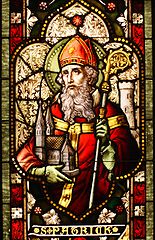
The Life And Writings Of Saint Patrick -Saint Patrick
II.—HIS BOYHOOD
Another miracle recorded of Patrick’s boyhood is interesting, because it goes to show that the child then dwelt in the lowlands near a river like the Clyde or the Leven. Once upon a time there came a great flood in winter, which filled the house and quenched the fire of his foster-mother. Patrick was hungry and called for food, but none could be had for want of a fire. Thereupon he stood on a dry spot, and dipping his fingers into the water near him the drops from his fingers became five sparks of fire, which lit the fuel, and caused the waters to recede from the whole house.
At another time, in winter’s cold, the holy boy Succat brought home to his foster-mother his lap full of icicles. “’Twere better,” she said, “you brought faggots for the fire.” “God can make them faggots if you only believe,” said Patrick. So the icicles were cast into the fire, and when Patrick blew upon them they flamed like firewood.
Once when Patrick and his sister Lupita were herding sheep, the lambs broke into their dams’ enclosure. Whereupon Lupita, running quickly to drive them off, fell and struck her head against a stone, ‘so that death was nigh to her.’ Then Patrick, in great grief, made the sign of the cross over the wound, and she was healed without illness; but the scar remained, and, as we shall see, served afterwards to identify Lupita at a critical period of her life.
Once as Patrick was herding the sheep a wolf carried off one of them. Thereupon his foster-mother blamed him greatly; but the wolf next day brought back the sheep safe and sound—truly a strange kind of restitution, as the narrative quaintly observes.
Once, too, when his foster-mother was milking the kine in the byre, one of them went mad; for a demon entered her—and she killed the other five kine. Then Patrick, seeing his dear foster-mother in sore distress thereat, brought back the dead kine to life, and cured the mad one, so that God’s name and Patrick’s were magnified thereby. On another occasion being present with his foster-parents at ‘a great folkmote of the Britons,’ his foster-father died suddenly, but Patrick restored him to life. Once again he changed water into honey for his foster-mother, and the honey had a great healing virtue over every kind of disease and ailment.
The next miracle, if there is anything at all authentic about it, gives us a glimpse of the simple manners of the times. Here it is, the Tripartite version:—Once the reeve or sheriff of the king (that is of the Britons) went to announce to Patrick and his foster-mother that they should go to cleanse the hearth of the palace of Ail Cluade. Patrick and his foster-mother went. Then came the angel to Patrick and said—“Make prayer, and that work will not be necessary for thee.” Patrick prayed. Then the angel cleansed the hearth. Whereupon Patrick said—“Though all there is of firewood in Britain be burnt on this hearth, thereof there will be no ashes on the morrow.” “And this is still fulfilled,” adds the writer.
This is a curious legend. That there was a nominal British king of Ail Cluade even during the Roman occupation of Valentia is fairly certain, and that the sheriffs of the king made strange demands for the royal service, both in Erin and Britain, is equally certain. The story hints that it was not proper to make such a demand of menial service from Patrick and his foster-mother, and therefore their obedience was rewarded by the ministry of the angel. The story, too, shows that they must have lived at the time near the rock of Dunbarton, and that families dwelling near the palace were required to keep the royal kitchen in due order.
We are told that on another occasion the steward of the king came to Patrick’s foster-mother to seek the usual tribute of curds and butter. She had none to give him. Then Patrick made curds and butter of the snow, and they were taken to the king; but on the royal table they became once more snow in the sight of the king, whereupon he remitted the tribute in favour of Patrick for the future. Such tributes in kind were the rule amongst all the Celtic tribes both in Erin and Alba, so we naturally find reference to them here. The picture of royalty these stories give us is not after our notions, yet it is quite in accordance with the manners of the times. But whether such a series of miracles performed by Patrick during his childhood can be reconciled with the truth of the account which he gives of himself we leave it to the reader to judge. Lanigan does not deign to notice them; and even the pious Colgan justly regards them as incredible. So that we can very well afford to regard them as the invention of imaginative story-tellers of a later age.

 Support Site Improvements
Support Site Improvements